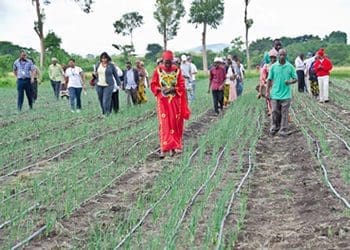Local onion farmers in Ghana’s Asante Akyem North District are demanding government intervention to regulate foreign imports that they claim are devastating domestic markets despite a strong local harvest.
The farmers argue that despite producing sufficient onions to meet national demand this season, cheaper imports from Burkina Faso, Nigeria, and Niger continue to dominate consumer preferences, leaving Ghanaian producers struggling to sell their crops at competitive prices.
Moro Adamu, Chairman of the Asante Akyem North Onion Farmers Association, has called for immediate restrictions on imports during the local harvest period. “Effective policies would protect local farmers, ensure fair market access, and reduce post-harvest losses,” Adamu explained during discussions with government officials.
The farmers’ concerns align with recent data showing Ghana imports 70 percent of its onions, costing approximately $2 million weekly, according to the Peasant Farmers Association of Ghana. This heavy reliance on foreign produce undermines domestic production efforts across key growing regions including Ashaiman, Keta, Navrongo, and Asante Akyem.
Adamu emphasized that securing the domestic onion market could create employment opportunities for young people, potentially reducing their dependence on illegal mining activities known locally as galamsey. “When young people see farming as profitable, they will choose agriculture over dangerous mining operations,” he noted.
The farmers’ appeal comes as Ghana continues to spend heavily on agricultural imports despite having suitable conditions for domestic production. Most imported onions arrive from neighboring Sahel countries, where production costs remain lower than in Ghana.
Local producers argue that without government intervention through import controls or protective tariffs, investment in onion farming will continue declining. They believe that creating a more balanced market environment would strengthen the entire onion value chain while contributing to national food security objectives.
The ongoing dispute highlights broader challenges facing Ghana’s agricultural sector, where domestic farmers frequently compete against subsidized imports from neighboring countries. Farmers across multiple crops have raised similar concerns about unfair competition from foreign produce.
Government response to the farmers’ demands remains pending as officials evaluate the potential impact of import restrictions on consumer prices and regional trade relationships. The outcome could set precedents for how Ghana balances support for local agriculture against international trade commitments.
The situation underscores the complex dynamics facing West African agriculture, where regional integration policies sometimes conflict with domestic farmer protection needs. Resolution of these tensions will likely require coordinated policy approaches that balance multiple competing interests.
Source: newsghana.com.gh











